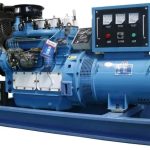Introduction
In today's world, where energy consumption is at an all-time high and environmental concerns are at the forefront of discussions, the need for efficient power generation solutions is more crucial than ever. Diesel generators have long been a popular choice for providing backup power in various settings due to their reliability and durability. However, with rising fuel costs and increasing awareness of the impact of carbon emissions on the environment, the focus has now shifted towards maximizing fuel efficiency in diesel generators. This article will delve into the importance of fuel efficiency in diesel generators, the factors that influence it, and the strategies that can be implemented to optimize fuel consumption.
Importance of Fuel Efficiency in Diesel Generators
Fuel efficiency in diesel generators is a critical factor that can have significant implications for both economic and environmental reasons. In terms of economics, fuel costs can constitute a significant portion of the operational expenses associated with running a diesel generator. By improving fuel efficiency, businesses and individuals can reduce their overall operating costs and increase their profitability. Moreover, with the volatility of fuel prices in the global market, having a fuel-efficient generator can provide a competitive edge by mitigating the impact of price fluctuations.
From an environmental perspective, diesel generators are known for their high carbon emissions compared to other power generation technologies. The combustion of diesel fuel releases pollutants such as nitrogen oxides (NOx), sulfur dioxide (SO2), and particulate matter, which contribute to air pollution and have adverse effects on human health and the environment. By enhancing fuel efficiency in diesel generators, the amount of fuel burned per unit of power output can be minimized, resulting in lower emissions and a reduced carbon footprint.
Factors Influencing Fuel Efficiency in Diesel Generators
Several factors can influence the fuel efficiency of diesel generators, and understanding these factors is crucial for optimizing their performance. The following are some of the key variables that can impact fuel consumption in diesel generators:
1. Engine Design: The design and specifications of the diesel engine play a significant role in determining its fuel efficiency. Factors such as the combustion chamber design, injection system, turbocharging, and cooling system can affect the engine's overall efficiency and fuel consumption.
2. Load Profile: The load profile refers to the variation in power demand over time. 300KW Diesel Generator For Sale are most efficient when operating at their optimal load capacity. Running a generator at lower loads than its rated capacity can lead to decreased fuel efficiency due to incomplete combustion and higher heat losses.
3. Maintenance: Regular maintenance and servicing of diesel generators are essential for ensuring optimal fuel efficiency. Dirty air filters, clogged fuel injectors, and worn-out components can impair the engine's performance and increase fuel consumption.
4. Fuel Quality: The quality of fuel used in diesel generators can have a significant impact on their efficiency. Contaminated or poor-quality fuel can lead to incomplete combustion, increased emissions, and reduced engine efficiency.
5. Operating Conditions: Factors such as ambient temperature, altitude, humidity, and operating environment can influence the fuel efficiency of diesel generators. Extreme weather conditions or inadequate ventilation can affect the engine's performance and fuel consumption.
Strategies for Optimizing Fuel Efficiency in Diesel Generators
To maximize fuel efficiency in diesel generators, various strategies can be employed to improve their performance and reduce fuel consumption. The following are some practical approaches that can help enhance the fuel efficiency of diesel generators:
1. Right Sizing: Selecting a diesel generator that is appropriately sized for the intended application is crucial for optimizing fuel efficiency. An undersized generator may operate at higher loads than its optimal capacity, leading to increased fuel consumption, whereas an oversized generator may run at lower loads, resulting in reduced efficiency.
2. Load Management: Implementing load management strategies can help ensure that the diesel generator operates at its optimal load capacity. By balancing the power demand and adjusting the load profile, fuel consumption can be minimized, and efficiency can be improved.
3. Energy Storage: Incorporating energy storage solutions such as batteries or capacitors in conjunction with diesel generators can help optimize fuel efficiency. Energy storage systems can store excess power during periods of low demand and discharge it during peak demand, reducing the reliance on the generator and conserving fuel.
4. Hybrid Systems: Hybrid systems that combine diesel generators with renewable energy sources such as solar or wind power can enhance fuel efficiency and reduce emissions. By integrating multiple power generation technologies, hybrid systems can provide a more sustainable and cost-effective solution for meeting power requirements.

5. Engine Tuning: Fine-tuning the diesel engine parameters such as fuel injection timing, air-fuel ratio, and turbocharger settings can improve combustion efficiency and optimize fuel consumption. Engine tuning should be performed by qualified technicians to ensure proper operation and avoid damage to the engine.
6. Regular Maintenance: Scheduled maintenance and inspections are essential for preserving the efficiency of diesel generators. Routine tasks such as cleaning air filters, replacing fuel filters, checking oil levels, and inspecting engine components can prevent performance degradation and maintain fuel efficiency.
7. Fuel Management: Monitoring fuel consumption, tracking fuel usage patterns, and implementing fuel management practices can help identify inefficiencies and optimize fuel consumption. Using high-quality fuel from reputable suppliers and adhering to proper storage and handling procedures can also contribute to improved fuel efficiency.
Conclusion
Fuel efficiency is a critical aspect of diesel generators that can have far-reaching implications for both economic and environmental sustainability. By understanding the factors that influence fuel consumption and implementing strategies to optimize efficiency, businesses and individuals can reduce operating costs, minimize carbon emissions, and enhance the overall performance of diesel generators. With the advancement of technology and the increasing focus on clean energy solutions, maximizing fuel efficiency in diesel generators is not only a practical necessity but also a responsible choice for a greener and more efficient future.
